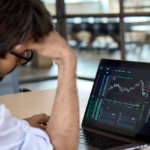GLOBAL stock markets have soared this year but some experts think a crash is on the way – but that means it could be a GOOD time to invest.
Experts say it’s a bit like going shopping in the sales – you’re buying shares at a lower price than they’re worth, but you’ll bag a profit as they’re likely to bounce back in the long term.

Right now there are fears we are in a so-called investment “bubble”, where money is being poured into artificial intelligence (AI) stocks.
Some commentators have likened the current market outlook as being similar to the dot com boom of the late 90s, when investors piled into internet stocks. Back then, markets soared before the “bubble” burst and it all came crashing down.
If you’re already an investor and you’re worried about losing money if the market crashes, there are steps you can take to protect yourself.
Investing is never without risk, so it is always important to make sure you are only putting money into the stock market that you can afford to lose.
‘There will be a stock market crash – but I’ll just keep investing’

GUILLAUME Serdan is not worried about a potential stock market crash; he believes his portfolio of 20 different stocks will keep growing regardless.
Guillaume, 32, who lives in London, started investing in 2017 with about $3,000 (£2,250) and now has a portfolio worth $116,000 (£87,000).
He says: “I started with a small amount of money and, as I got more comfortable, started to add more,” he says. “I pick companies I understand and that resonate with me, that have good management, and are durable businesses that I am happy to invest in for the next ten years.”
The first market dip he experienced was at the start of the Covid pandemic in 2020, when global stock markets saw their worst day since 1987. But rather than panicking, Guillaume simply invested more.
He spreads his money across different themes including artificial intelligence, entertainment businesses and luxury goods.
For example, he owns the software giant Microsoft, which he believes will continue to do well even if technology stocks fall out of favour, because its software and cloud computing services are relied upon by so many businesses across the world.
He also backs the likes of Hermes, Kering (which owns top brands like Gucci and Balenciaga) and LVMH (which owns Tiffany & Co and Christian Dior, among others). “These are aspirational brands with an aura of scarcity. Their customers’ wealth is not usually affected by typical pressures,” says Guillaume.
His other investments include Netflix, Apple, Walt Disney and Lululemon.
“My portfolio is up about 27% in six months,” says Guillaume. “I only know two things for sure: there will be a crash at some point, and then the market will recover.”
You should be investing for the long-term (usually a minimum of five years) as this gives you time to ride out and any ups and downs that may come. Because, while the stock market invariably will dip, over the long-term it should recover and rise.
It’s important not to panic and sell your investments when they have fallen, or you will miss out on this recovery.
And, finally, it is important to spread your money across different types of investments. This is known as diversification. The current fears, for example, are about technology and AI stocks, so make sure you have investments in different sectors too, which won’t be affected if these stocks fall out of favour.
So-called “defensive” stocks are those that should not fall as much as others in a market crash. This is usually because their products and services are always in demand, regardless of what is happening in the world.
We asked experts to pick 10 stocks that should do well in a downturn. Share prices correct as of 23 October 2025
Tesco
When consumers are feeling the squeeze they cut back on so-called discretionary spending. That means eating out, going to the cinema, new clothes and luxuries like holidays.
But even when times are tough, shoppers will keep going to the supermarket to get the essentials, and companies like Tesco are well placed to benefit. A recent example of this was during the Covid pandemic, when people rushed to stock up on items such as pasta and toilet rolls in uncertain times.
Tesco has a 29% share of the UK grocery market, making it the biggest supermarket in the country.
Job Curtis, manager of the City of London investment trust, thinks its Clubcard scheme gives it an edge over its competitors, and the data this generates means Tesco knows its customers better than anyone else.
Shares are up 26% over the past year to 444p.
MHA
An accounting services firm might not sound like the most exciting company, but it gets a lot of steady, repeat business from its customers, which means it should have a reliable income stream even during a downturn.
Tighter regulation in the sector is a good thing for MHA, says Brendan Gulston, co-manager of the Gresham House UK Multi-Cap Income fund, because companies want to use a reputable business to make sure they don’t fall foul of any rules.
Because it has a strong balance sheet (it has money to invest), it has the potential to buy up smaller rival firms too, to help further grow the business.
“We see it as a solid, dependable business that can perform well whatever the economic climate,” says Gulston.
Shares are up 42% over the past year to 145p.
Marsh McLennan
Regardless of what happens in the stock market or the economy, people will still need to buy insurance, which bodes well for the New York-based insurance broker Marsh McLennan.
Tom Wildgoose, from the investment firm Sarasin & Partners, says the firm could benefit from the growing number of complex, insurable risks in the world, such as cyber attacks.
As well as holding up in the event of an economic downturn, Wildgoose thinks the company will continue to thrive as the economy recovers and its customers have more to insure. Shares have fallen 18% over the past year, but are up 66% over five years, at $189.
Anglo American
One of the biggest mining companies in the world, Anglo American mines copper, platinum, diamonds and coal, to name just a few.
Brian Dennehy, managing director at FundExpert, thinks it is well placed to benefit as demand for these resources continues to grow.
Its products are needed in everything from the chips that go into our computers and smartphones, to rebuilding infrastructure such as roads and railways.
Mining companies can be volatile to invest in as demand for their products ebbs and flows, so expect some ups and downs along the way, warns Dennehy.
Shares are up 44% over the past year to £28.83.
Franco-Nevada
Rather than operating its own mines, Franco-Nevada is a so-called gold royalties business, which means it invests in other companies that operate gold mines and takes a percentage of what they produce.
Greg Eckel, manager of Canadian General Investments, has been investing in Franco-Nevada since it first listed on the stock market in 2007. He likes that the company, which is based in Canada, pays a reliable dividend (where a company returns some of its profits to shareholders), and has increased this payout every year for 18 years.
The firm has seen its share price rise as the price of gold has soared – shares are up 41% over the past year to CAN$265.
Walmart
A supermarket option on the other side of the pond, Walmart is an American retailer with a focus on low-cost groceries and household staples. In a cost of living crisis, it could pick up new customers who are trading down from higher-end stores as they tighten their belts.
Sam North, market analyst at eToro, likes that the firm is growing its online business and that it is a reliable dividend payer.
“During previous downturns, Walmart has shown it can grow its market share and maintain sales growth, making it a reliable haven for investors when volatility spikes,” he says.
Shares have soared 80% over the past year to $107.
NatWest
Banks are fairly reliable businesses to invest in, although they can suffer if there is a recession because the number of customers who default on loans, mortgages and credit card payments tends to increase.
But Curtis doesn’t think we’re headed for a major downturn, so is positive on the outlook. Banks also tend to do better when interest rates are higher, as this can boost their profits, he points out.
He likes NatWest as a solid UK high street bank which, unlike some of its rivals, doesn’t have any exposure to the motor finance compensation debacle. Shares have risen 52% over the past year to 545p.
British American Tobacco
In a more health-conscious world, the idea of investing in tobacco stocks might not be very fashionable, but Curtis says they are very reliable investments.
Because their customers are addicted, these companies have what is known as “pricing power”, which means they can raise their prices to offset any increases in business costs without worrying that people will stop buying their products.
As cigarette smoking becomes less popular, many of these businesses are also exploring new “next generation” products such as vapes and nicotine pouches, which gives them a new revenue stream.
Curtis likes British American Tobacco, which owns brands including Dunhill and Rothman. The company also pays a dividend to investors. Shares have leapt 44% over the past year to £38.41.
Centrica
Demand for essential services such as heating and hot water stays steady regardless of what is happening in the economy, which makes utilities firms a relatively safe bet if you think we’re headed for a downturn. These businesses are known as non-cyclical, meaning that demand for their services does not go in cycles but remains constant.
Chris Beauchamp, chief market analyst at IG Group, likes utilities firms such as Centrica – the owner of British Gas – because they are able to raise their prices inline with inflation each year.
“Such companies provide something of a haven in downtowns. Centrica was particularly strong in 2022, riding out the volatility that year in fine style,” he adds. Shares are up 44% over the past year to 178p.
NextEra Energy
A US utilities name, NextEra Energy is a Florida-based electricity provider and energy infrastructure company. As well as getting a reliable revenue stream from its electricity customers, Etoro’s North thinks the firm’s involvement in renewable energy, including wind and solar, means it is well positioned for the energy transition in the years ahead.
“Its proven resilience in past market corrections and a balance between being a traditional, reliable utility and that sustainable long-term growth make it a standout option for defensive investors,” says North.
Shares are down 2.5% over one year, but up 9% over five years, at $83.
I’M NEW TO INVESTING – WHERE DO I START?
You can start investing with as little as £1 – it’s not just for the super rich.
But make sure you have enough money to invest and that you’re prepared to lose it all. Experts say you should have three to six months’ worth of wages in a savings account you can access before you start.
You’ll then need to decide what sort of investment you want to make.
Choosing a ready-made fund is often the easiest way to get started if you’re brand new to investing.
“Cautious” or lower-risk funds have a less invested in the stock market and more in government bonds and gold.
“Adventurous” funds are more risky as they have more invested in the stock market, but they can give you better returns.
“Balanced” funds are somewhere in the middle.
You can then choose what website or app you want to use to invest with. The key things to check are the fees and the minimum amount you need to invest.
Some apps, like Wealthify, let you start with just £1.
Other companies like Hargreaves Lansdown and AJ Bell are good options if you want to be more hands-on in choosing which funds and shares you invest in.
Be aware of risk
IF you have enough cash savings to invest – then the returns are impressive.
On average, since 1899 the stock market has delivered an average return of 4.8% a year, compared to an average of 0.5% if you kept your money in cash savings, according to Barclays.
That means if you had put £100 in the stock market in 1899 it would be worth £31,888 in real terms today, while the same amount put in cash would be worth just £190.
But as we have seen recently, the stock market can also fall.
The American stock market saw its biggest drop since the start of the Covid pandemic after US President Donald Trump announced plans to introduce punitive tariffs on goods imported to the US from other countries.
The UK’s own stock market, the FTSE 100, fell by more than 10 per cent after the news.
This is only actually a problem if you need to access your money but if you’ve got a long-term savings goal then the market will usually bounce back.
Ups and downs in the market are called “volatility”, but the idea is that over the long-term you can ride out these bumps and your money will grow, although it can feel uncomfortable at the time.
That means it is crucial that anyone considering investing is willing to tie their money up for a minimum of five years, as this gives your investments time to recover from any dips.
You do need to be prepared to lose it all.












No Comment! Be the first one.